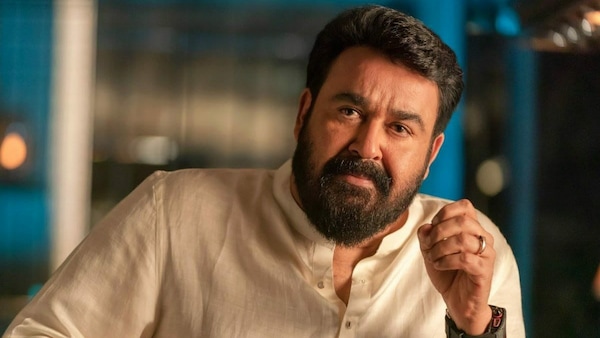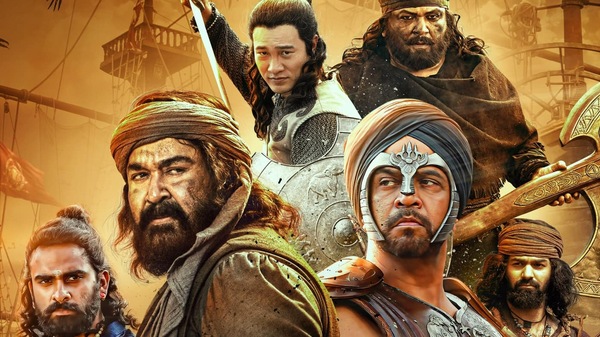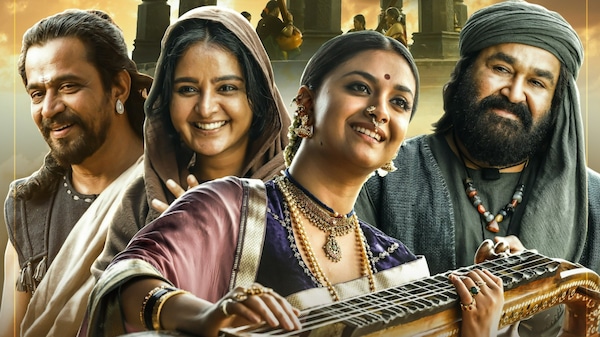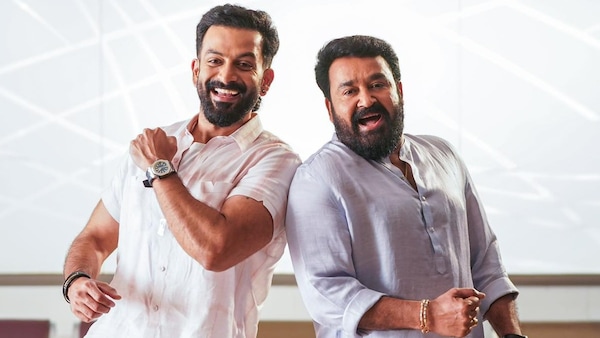Exclusive! Mohanlal: If Marakkar was a ‘mass’ film, it wouldn’t have won National Awards
The Malayalam superstar talks about the reception of Marakkar: Arabikadalinte Simham, his bigger goals while making movies, managing fans’ expectations and more

Last Updated: 11.39 AM, Dec 04, 2021
After many months of speculations, apprehensions and anticipation, Mohanlal’s big-budget period film Marakkar: Arabikadalinte Simham hit theatres worldwide three days ago, exactly three years after it went on floors in 2018. When we caught up with the reigning superstar, the makers had claimed it had already surpassed several records that the actor’s movies such as Drishyam and Lucifer had set over the years.
Taking a break from a hectic schedule of Vysakh’s Monster, Mohanlal talks exclusively to OTTplay, in his first extensive interview after the release of the Priyadarshan’s directorial, about the movie’s reception, his bigger goals while making movies now and managing fans’ expectations.
Marakkar released after a long wait in theatres. Are you happy about the reception?
I am someone who is always happy. The shoot of Marakkar began on December 1, 2018 and we released it exactly three years later. During this entire period, we ensured that not even a single clip of the movie was leaked. These days, that’s a huge challenge, because as soon as a movie is released, its footage is captured and uploaded online. This along with piracy kills the film industry. We didn’t even send this film to a lot of international film festivals, fearing the leak. Right now, I am so happy that people waited for so long and are now watching it in theatres. It’s a joy not just for me, but the entire film industry.
But there’s another side of it too. A movie is made after a lot of pain-staking effort. There are critics, whose job is to review a movie. But now, it’s sort of turned into a situation where anyone can say anything and there’s this tendency to degrade films. It’s a crime against the industry and people who do that should think about the consequences of their action. It’s not benefitting them in any way. When a person who sits behind a screen puts out a comment, it adversely affects an industry that has lakhs of people depending on it.
It’s not just about this movie, I have seen it happen with a lot of films for no reason. If it’s constructive criticism, then we are all for it. But when someone, who isn’t aware of the craft or film critique, lambasts movies based on whatever comes to his mind, it’s wrong and it’s a tendency that is mostly common in youngsters now.

Is it also because you are a huge star and hence a big target?
It could be. I have been acting for over 40 years, but it’s not targeted against particular individuals. Movies of all actors come under this attack. People should be more aware. We should know that we have a limited lifespan on this planet and we should spend that beautifully. We have no right to hurt a person mentally or physically. We are all taught to live in harmony and when people who have learnt these lessons behave contrarily, it is disappointing. We shouldn’t try and destroy an industry. We have to move forward positively.
What does the reception of a massive film like Marakkar mean for the Malayalam film industry going forward?
In case of Marakkar, what we have done is take a historical figure, about whom very little is known – be it about his whereabouts or descendants – and use our imagination to tell a story. The most interesting inspect about what is known about him are his naval expertise, the bond he shared with his people and the Zamorins’ betrayal. We weaved all of that in and made a story out of it. This had a lot of possibilities because it’s been years since a film of such a genre came out; and we wanted to do it well – be it the cinematography, VFX, songs, editing or emotions. When such a script came along, we went ahead with it.
About the grandeur aspect, only if you do such a film, you can make a bigger movie next; otherwise, you will only be able to make films on limited budgets. After Priyan and I made Kaalapani or Vanaprastham or even Lucifer, we could make bigger films. I am set to resume work on my directorial debut Barroz next, in which the cost of production is much more than Marakkar; it’s a 3D children’s fantasy film. After that we are planning Empuraan. So, we can mount movies on larger scale only if we let the world know about our movies and expand our market. Otherwise, entity-wise our movies would just be limited to Kerala.
When you had decided to do Drishyam 2, it was because you wanted a film that would bring people back to theatres after the first lockdown, even though it eventually released in OTTs…
It’s just that when we finished the film, theatres didn’t reopen. We initially decided to do Drishyam 2 only to bring people back to theatres by providing a movie that they couldn’t refuse. Because of the impact that first film had created, people would want to watch what would happen next. We were hoping theatres would reopen, but they didn’t and that’s why we gave it to OTTs.

Even for Marakkar, it was also made with the aim of expanding the market. So, while choosing your projects, do you also keep these bigger goals in mind apart from just providing entertainment?
If the entertainment industry has to grow, we need such films. We can’t and don’t need to fund a project that would fail. As I said, if we want to make bigger movies, films like Marakkar have to generate revenue and this bodes well, not just for me, but others too. There are so many possibilities to make massive movies. Right now, we are in the middle of a pandemic, otherwise a lot of people would have planned big projects. We just have to create the market for that.
Are you also conscious about the expectations and risk that come with making a big film, especially a superstar-driven one?
You can never gauge expectations. Marakkar is a National Award-winning movie. If it was a ‘mass’ entertainer, it wouldn’t have won awards. Here, we have to look into its making, script, emotions; we are telling a story. There are so many people who say that it’s an enjoyable movie. Fans too should understand. We can’t make every movie for fans; you can’t have Marakkar doing somersaults and sending the villains flying throughout the film. In that case, Marakkar’s character changes; we have done those types of stunts in other movies. So, expectations should be based on the movie. There would be so many people who had expectations, watched the movie and liked it. Fans have a concept that all films should be in a particular way, the onus is on us to break that. Marakkar has been presented in a way that the majority would enjoy, but they have to find the moments they like in it. It will now be difficult to make movies that would only cater to a small group.
But how important is the packaging of a movie, especially when the audiences now have limited attention span and high exposure to international cinema?
Marakkar was a movie that should have hit theatres a long time ago; it has become a topic of discussion because of the delay. The priority has always been to improve the quality of the film and now we have all kinds of possibilities – to improve its technical standards based on the theme of the movie that we are making. There are so many platforms available too; if you don’t want to release your film in theatres, you can approach OTTs or release it online yourself. When such prospects exist, we can survive only if we make films that stand out.

Marakkar as a film also had two generations of talent – in front and behind the camera, with Pranav Mohanlal, Keerthy Suresh, Siddharth Priyadarshan and Ani IV Sasi. How much did that help in the making of the film?
It definitely helped. Priyan’s son had done the VFX, those who had assisted him as well those who composed the music were young minds. They were involved in the making of the film and their thoughts were definitely considered.
For my directorial Barroz too, a lot of people who are working with me are youngsters. But in cinema, there’s no disparity between young and experienced; we need minds and a film comes together through brainstorming sessions that include everyone. For Barroz, we prepared the script after discussions with a lot of children and read the script to many youngsters. Its lead actress is a teenager. We have brought in a lot of elements that would appeal to the youngsters.
In terms of marketing and the markets it opened up for Malayalam cinema, how much of an eye-opener was Lucifer?
I wouldn’t say it opened a lot of markets but now people are highly aware of the way of making a film. Those working in Hindi, Telugu, Tamil and abroad make a lot of big films and know the tricks of the trade. In Malayalam, with Lucifer, we could give a well-crafted, visually-appealing movie within our limitations.
A film like Drishyam worked well and its characters were relatable because of the brilliance of the script. The only way we are able to compete with big films from other industries is through our brilliance – by way of the scripts, subject selection and the quality of filmmaking. Consequently, we are expanding our markets. People are now dubbing our movies, buying their remake rights. Drishyam was a huge hit in China and that’s when the pandemic happened. We sold the rights for its Indonesian and Korean remakes and even Lucifer is now being remade in Telugu with Chiranjeevi. So, the market is expanding and a lot of non-Malayalis are now watching our films.

During the pandemic, you have also made movies specifically for OTTs like Bro Daddy and 12th Man.
When theatres didn’t reopen and everything was at a standstill, I am someone who went and did a movie, Drishyam 2. We were scared but we decided to do the film because the wheel of the film industry had to turn and for the benefit of so many people who are part of cinema. If I had contracted COVID-19, everything would have come to a halt.
But again, when the lockdown was announced this year, I could have been home idle. But a lot of people depend on the industry for their livelihood and that’s when we decided to do small films for OTTs that can be watched by a lot of people. However, the two movies we are doing right now (Alone and Monster), we still haven’t sold the rights to OTTs. We will take a call based on the situation of the theatres. I am someone who has a strong relationship with theatres for over 40 years.
Subscribe to our newsletter for top content, delivered fast.

